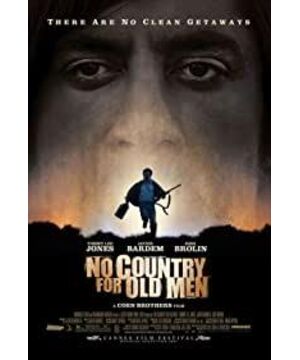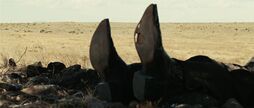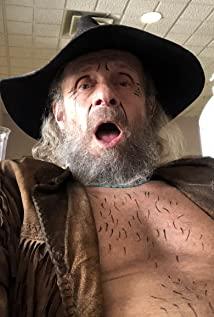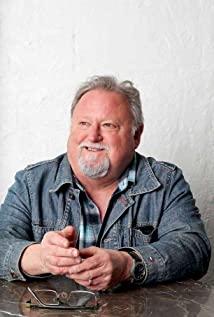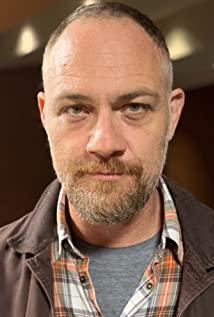"Old Nowhere" is mixed with melancholy and loss, and is similar in style to the early film "Blood Maze" by the Coen Brothers and later "Ice and Blood Storm". But compared to these two films, "Old Nowhere" appears more mature and stable. The complex and changeable progress of the lens is gradually replaced by a calm and calm fixed lens. The Coen brothers discarded a lot of previous filmmaking skills, and adopted a concise and detailed description method. The silent and stable lens language brought out a neutral and relatively realistic atmosphere. , The character activities are closer to the state of daily life. In the 1980s, the rich western-style scenery and dialect of Texas created a unique time-space framework for the film. The characters are integrated into the limited story scenes, thus forming the film's unique logic and plot advancement method. This method is similar to the snow scene in Minnesota in "Ice and Blood Storm", that is, it depicts what Frederick Astluc called "a certain American-style geographic status quo," Texas is within the border. Outside the border, it corresponds to the entire United States, which is a whole that is a malformed combination of diaphragm and connection. In this marginal society, the rules of survival of special groups are deduced. The evil of human nature is infinitely expanded. The lonely wilderness contains the sense of crisis and loss of modern people. Law and morality are no longer important. Justice and axioms are reduced to nothingness. Individuals cannot escape their destiny. Ridicule and jokes. This point precisely corresponds to the "skepticism" mentality that prevails in modern American society.
Perhaps influenced by McCarthy's style of writing, "Old Nowhere" appears heavier and gloomier than other Coen Brothers movies, and the constrained scene contains unpredictable crisis. The abstract treatment of characters makes people a factor in history and the environment. In other words, in the face of the environment, people are no longer important. In the black absurd world created by the Coen brothers, even if people have the intention, they will eventually become powerless. Therefore, in "Old Nowhere", each person represents only a social type, without overly complicated psychological changes, and a person is just a symbol. For example, what Moss represents is the most common tendency of human nature, that is, eager to change the status quo and let himself survive better, so he can't stand the temptation of two million dollars and leave with money. At the same time, he couldn't stand conscientious condemnation. He felt compassion for the drug dealer driver who was abandoned in the wilderness and thirst for water, and returned. This is exactly what caused Moss to be fatal. In the view of the Coen brothers, the greed and selfish desires that exist in human nature are often used by others. From the moment Moss ran away from home, he has been abandoned by his own pursuit, and the rest is just aimless escape. The whole movie has thus become a thrilling cat and mouse game. From a certain perspective, Moss was innocent, but for the two car drivers who died tragically under the Qigu air gun, Moss' death was obviously more inevitable. In the film, no one is a bystander. The wheel of fortune weaves everyone together. Fear, struggle, begging for mercy, or even fleeing are of no avail. The only difference is luck or misfortune. The killer Chigu and the old policeman Bell represent evil and justice respectively, just like two ends of a balance. It’s a pity that Tianping always leans toward the evil. Justice and axioms are so powerless in the face of evil. In fact, Bell has been avoiding the face of Qigu. In fact, he has never met Qigu, every time he is in Qigu. After the crime was long overdue, behind Bell's seemingly high-sounding truth, there is a kind of fatalistic helplessness and sorrow hidden. In a violent world, he is just an idly bystander. To face evil, he must face death, and he obviously does not have such courage. Bell babblingly misses the good old days, which can only prove that he is not fit to live in this world. Similarly, justice and axioms are not the products of this era. On the other hand, Qi Gu, this person represents a kind of pure evil. The purpose of his killing is extremely unclear, perhaps just out of a kind of evil instinct, from the beginning of strangling the police with handcuffs, to killing the luck of actively helping him. The chicken cart driver, Qi Gu's actions can only be attributed to a primitive animalism. What is ridiculous is that the air gun he is holding is exactly the tool used by the slaughterhouse to slaughter animals. In fact, Qi Gu looks more like a verdict The god of life and death asks the opponent to guess the details of the coin when he kills, which is frightening. The old gas station owner was lucky. He guessed the coin and won his life. Because of this, Qi Gu would sincerely warn, "As long as it is not (put the coin in) his pocket, because there will be mixed with other coins. Together, it should be an ordinary coin. It shouldn't be treated like this." Moss's wife refused to guess and refused to give her a reason to survive. There is a scene in the film that is worthy of fun. In the gas station, Qi Gu stared at the boss, and put the sugar paper on the table.
The film unfolds in a slow rhythm, and through unique sound control and montage conversion, it creates a sense of psychological oppression. The protagonist walks through a numb and almost dull world, forming a peculiar process that is different from the normal time development process. At the beginning, the Coen brothers tried to exaggerate violence, from the bloody scene of the death of a policeman in Zigule at the police station to the desert The stray corpses, and even Qi Gu's cruelty to kill passers-by and even a sleeping crow at the bridgehead, made people restless. Time is almost stagnant. In this film that abandons music rendering, silence creates a gloomy and terrifying atmosphere, forcing the audience to listen carefully to each of the film’s exceptionally clear sound effects, and inevitably fall into contemplation. In the second half, the Coen brothers adopted a completely opposite image processing method. The violent scenes that have been spread out before basically adopted the omission method. The audience often saw only the results of the crime, such as Qigu killing the chicken truck driver. The details, the details of Moss's fight with the Mexicans, and the details of Zigu killing Moss's wife, are all omitted. The advantage of this is also to force the audience to think, but also to make the film more concise and moving. At the same time, the environment in which the character is located looks more hostile. The concepts of the innocent and the participant are completely confused, and the individual falls into a kind of helpless panic. In the eyes of the Coen brothers, the loneliness of modern people is manifested as a kind of unreasonable separation and hatred. Destiny cannot be controlled, just like Moss originally fleeing for money, but in the process of fleeing, we found that money has lost its meaning, whether it is a stalker or a fugitive. Everyone is caught in the trap of fate and struggling. . When we are wondering, can we become the strong in life only if we obey the evil instinct of human nature? The Coen brothers immediately denied this idea, and Qigu's car accident showed us the impermanence of fate. All things that seem to be strong on the surface turned out to be so vulnerable. The details of Qigu buying clothes from the two children are exactly the same as the details of buying clothes from passers-by when Moss was injured. The difference is that Qi Gu is facing a child who represents the future and hope? In that case, do we have a future and hope?
The film’s perspective is chaotic. The Coen brothers carefully constructed a maze of confusion, such as the scene of several consecutive shooting of characters from different angles back to the desert shootout, and the scene where Chigu enters the hotel where Moss is staying with an air gun. The scenes of the confrontation between Qi Gu and the Vietnam War veterans were all shot from a peculiar angle, and some shots were even shot from the perspective of animals. At the same time, excluding music rendering makes the film's plot and plot lack a necessary foreshadowing and causal relationship. The audience can't guess the plot behind. Montage replaces the willingness of fluency, and tragedies and crises appear to be more sudden. The cruelty of reality is dispelled by a kind of absurd black humor. For example, when Qi Gu killed the driver of the chicken truck, a piece of funny remarks made by the driver of the chicken truck in front of him actually neutralized the cruelty brought about by death, Cohen The brothers' unkind ridicule of the tragedy made the violence even more natural. This is "Old Nostalgia", a world that is not suitable for the survival of justice and nostalgia.
View more about No Country for Old Men reviews


